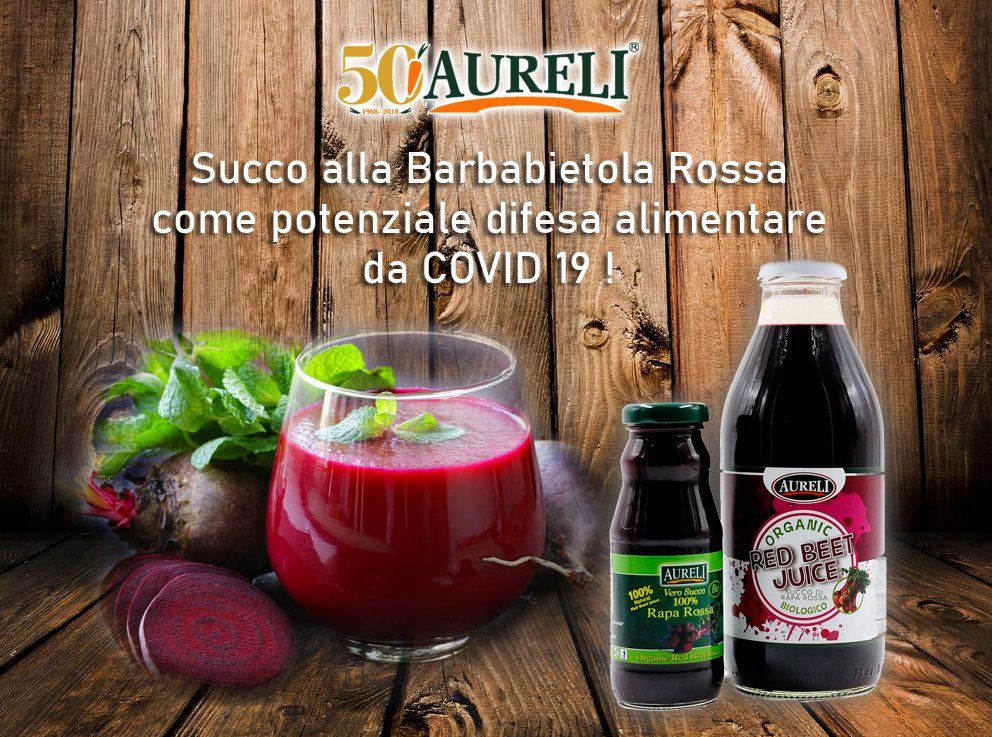Research and Development
December 11, 2020
Beetroot juice as a potential food defense against COVID 19
Numerous pathological states of the cardiovascular system, including hypertension, atherosclerosis and ischemic diseases, are characterized by decreased production or bioavailability of nitric oxide. While a healthy endothelium typically provides adequate amounts of nitric oxide produced by the enzyme eNOS (endothelial nitric oxide synthase), endothelial dysfunction leads to a reduced ability to counteract inflammatory processes and oxidative stress. SARS-COV2 (COVID-19) infection generates a disease, which begins in the respiratory tract, but affects the endothelial cells of the microcirculation throughout the body, with particular severity in patients with cardio-metabolic problems and hypertension [1].
Louis J. Ignarro, Robert F. Furchgott and Ferid Murad were awarded the 1998 Nobel Prize in Physiology/Medicine for their discoveries relating to nitric oxide as a signaling molecule in the cardiovascular system [https://www.nobelprize. org/prizes/medicine/1998/ignarro/lecture].
Starting from this evidence, two very recent scientific articles have suggested the possible role of the availability of endothelial nitric oxide in antiviral resistance to COVID.
The researchers' hypothesis was based on the correlation observed between mortality from COVID-19 and decrease in the production of vascular nitric oxide in patients depending on age and comorbidity with pathologies, and above all on the observation that the ACE2 receptor, a entry of the virus into cells, is a regulator of vascular function by mediating release of nitric oxide (NO) which is altered by the interaction with SARS COV2. Consequently, researchers have suggested that the use of nitrate-rich vegetables, such as spinach, rocket and beetroot, may represent a first line of defense in the initial stages of viral invasion [2].
Practically at the same time (May 2020), another article suggested how the restoration of nitric oxide levels through the intake of inorganic nitrate through the diet could be taken into consideration for the prevention and early treatment of COVID-19 infection. 19 acting at two levels: canceling the endothelial dysfunction and associated thrombosis and decreasing the viral load [3].
In a very recent scientific article published in the journal Frontiers in Nutrition, with a very explicit title: “Covid-19 Quarantine: Impact of Lifestyle Behaviors Changes on Endothelial Function and Possible Protective Effect of Beetroot Juice” [4] the Brazilian research group explicitly encourages the consumption of vegetables rich in nitrates, such as red beetroot juice, for quarantined patients who have poor bioavailability of nitric oxide in endothelial cells to counteract the negative metabolic effects of home confinement.
That red beetroot juice is a source of nitrates useful for the integrity of the response of the human cardiovascular system has now been experimentally established.
For more than a decade, the existence of the endogenous production pathway of nitric oxide has been demonstrated starting from the transformation of nitrates-nitrites to nitric oxide, linked to the intake of nitrates, through a diet based on broad-leaved vegetables or beetroot juice, and the activity of oral microorganisms. The process is independent of human enzymatic activity and begins in the mouth by anaerobic bacteria with the reduction of dietary nitrate (NO3) to nitrite (NO2). The nitrite is then swallowed with saliva and is transformed in the stomach into nitric oxide (NO) by entering the bloodstream through the mucosa.
In the blood, the absorbed nitric oxide can be transformed back into nitrite and nitrate, but in the tissue microcirculation where there is a higher demand for blood flow (relative hypoxia) linked to metabolic activity (e.g. skeletal or cardiac muscle, or neuronal), the nitrates are reduced again to nitrites and nitric oxide causing vasodilation [5].
This spontaneous chemical process is more pronounced in hypoxic, acute or chronic conditions as happens for example in respiratory system pathologies, where the cellular mechanism linked to the oxygen-dependent activity of the enzyme synthesizing nitric oxide is compromised and the production of NO is predominantly dependent on nitrate-nitrite chemical conversion.
The restoration of nitric oxide levels by taking nitrate through the diet can therefore have preventive effects in COVID infection, in its early treatment and in post-infection recovery, also considering that advanced age is in itself a risk factor for cardiovascular disease and vascular endothelial dysfunction. A fact that has attracted great attention is the so-called Japan paradox which consists of the observation of a lower number of cases and lower mortality from COVID 19 in this country [6]. This reduced severity of COVID disease has been linked to the Japanese diet characterized by abundant amounts of nitrates, thus improving vascular function [7, 8].
Red turnip is among the richest natural sources of nitrates. Turnip juice contains high levels of nitrate (NO3) which can be converted into the bioactive form, nitric oxide (NO) through the entero-salivary circulation. The simultaneous presence of antioxidants in beetroot juice, such as betanines, vitamin C and flavonoids, prevents the generation of unhealthy molecules, such as nitrosamines, at the gastro-intestinal level.
Furthermore, the compositional characteristics of red turnip, rich in carbohydrates and micronutrients with bioactive properties, make it a natural dietary source of healthy substances with therapeutic effects demonstrated in various pulmonary and vascular pathologies [9].
It is widely known that the biochemical composition of plants is profoundly influenced by climatic conditions, soil, and the cultivation system: use of fertilizers and pesticides, or organic cultivation.
Consequently, it is of fundamental importance to have complete knowledge of the origin and the treatments that plants undergo, and thus to have reliable labeling that allows us to guarantee the safety and composition of the product consumed. A healthy diet based on vegetables selected and guaranteed in the individual transformation processes, such as beetroot juices produced by serious farms such as the Aureli Company, can be a potentially valid defense support against viral attacks such as those from SARS-COV- 2.
The idea of providing a solution with a more defined health impact of food products, such as vegetable juices, starting from the agronomic and biochemical study to arrive at a more precise knowledge of the composition of what we are eating and what can be good for us health, without distorting the starting product with additions of supplements, starts from very far away within the Aureli Company. An agricultural company, linked to the Fucino area, but with a vocation for the internationalization of its transformed organic agricultural products.
The idea, born from the Aureli company, developed thanks to the collaboration between the R&D department of the agricultural company and the Departments of Chemistry and Environmental Biology of the University of Rome “La Sapienza”. Through the applications of advanced technologies, such as metabolomics based on NMR spectroscopy, the quality of the products has been optimized by analyzing the production process from the ground to the final transformation, starting from the knowledge of all the biochemical components present in the fresh tuber up to the juice in bottle, allowing you to refine the process in every step. This means optimizing, on a natural and organic basis, the biochemical composition of vegetable juices and the use of by-products, and above all knowing perfectly what you drink or eat.
The Fucino plain, with an altitude of 660 meters above sea level, and particular pedoclimatic conditions, is naturally suited to the cultivation of root, tuber and bulb vegetables; Fucino is in fact famous for the carrot and potato, both with protected geographical indication (PGI)
The exchange of information between "ancient" knowledge and modern science with the careful selection of seeds and cultivars, the particular and refined cultivation and agronomic techniques, the innovative transformation technologies and the application of innovative biochemical analyses, brings to a virtuous recycling, from the land to scientific evidence and from there back to the land, ensuring high quality of the product in relation to the content of bioactive and healthy compounds in the different years of cultivation.
In the particular case of red turnip juices, the Research and Development department, together with the Quality Control and the agronomic department of the Aureli Company, has carefully studied the raw material during the growth and development of the plant in the various years of agronomic rotation to make point a cycle of cultivation, production, processing, until the optimal harvest time is identified with the aim of guaranteeing high quality in health terms, through balancing the nitrate content with the quantity of antioxidant molecules, typical of red beetroot .
Articles cited:
(1)Varga A, Flammer AJ, Steiger P, Haberecker M, Andermatt R, Zinkernagel AS, et al. Endothelial cell infection and endotheliitis in Covid-19. Lancet 2020; 395: 1417e8
(2)Ozdemira B., Yazicib A - “Could the decrease in the endothelial nitric oxide (NO) production and NO bioavailability be the crucial cause of COVID-19 related deaths? - Medical Hypotheses 144 (2020) 109970
(3)Green SJ - Covid-19 accelerates endothelial dysfunction and nitric oxide deficiency - Letter to the editor / Microbes and Infection 22 (2020) 149-150.
(4)Mônica Volino-Souza et al. Covid-19 Quarantine: Impact of Lifestyle Behaviors Changes on Endothelial Function and Possible Protective Effect of Beetroot Juice Front. Nutr. 7:582210. doi: 10.3389/fnut.2020.582210
(5)Lundberg JO, Weitzberg E, Gladwin MT. The nitrate-nitrite-nitric oxide pathway in physiology and therapeutics. Nat Rev Drug Discov. 2008; 7: 156-67. doi: 10.1038/nrd2466
(6)A. Iwasaki, ND Grubaugh, Why does Japan have so few cases of COVID-19? EMBO Mol. Med. 12 (2020), e12481.
(7)T. Sobko, C. Marcus, M. Govoni, S. Kamiya, Dietary nitrate in Japanese traditional foods lowers diastolic blood pressure in healthy volunteers, Nitric Oxide 22 (2010) 136–140.
(8)ML Sundqvist, FJ Larsen, M. Carlstrom, M. Bottai, J. Pernow, ML Hellenius, E. Weitzberg, JO Lundberg, A randomized clinical trial of the effects of leafy green vegetables and inorganic nitrate on blood pressure, Am. J. Clin. Nutr.111 (2020) 749–756.
(9)Mirmiran, P., Houshialsadat, Z., Gaeini, Z. et al. Functional properties of beetroot (Beta vulgaris) in management of cardio-metabolic diseases. Nutr Metab (London) 17, 3 (2020)
…the latest Articles
List of services
-
NEWS: Specific foods to combat LONG COVID syndrome Red Beetroot Juice04.05.2022 - The preliminary clinical study has just concluded: "Barbarossa Study: Evaluation of the effects of red beetroot juice supplementation on fatigue, inflammatory status and endothelial function in adult subjects attending the Post-COVID Day Hospital, conducted by research group of the Catholic University of the Sacred Heart of Rome and the A. Gemelli IRCCS University Hospital, directed by prof. Francesco Landi, in collaboration with the NMR-based metabolomics Laboratory (NMLab) research group at Sapienza University in Rome, directed by prof. Alfredo Miccheli, and with the Research and Development department of the Aureli Mario Agricultural Company, directed by Walter Aureli....
-
Red beetroot juice, a superfood for sporting activity.03.31.2021 - Recent studies indicate that the dietary intake of nitrates, through the consumption of red beetroot juice. Recent studies indicate that dietary intake of nitrates, through the consumption of beetroot juice, can: (a) improve muscle efficiency by reducing oxygen cost for sub-maximal exercise and therefore improve exercise performance of resistance; (b) improve the contractile function of skeletal muscle and improve muscle power and sprint exercise performance Numerous international studies have shown....
-
Beetroot juice as a potential food defense against COVID 1911.12.2020 - Scientific information from R&D Aureli Mario Company - Nitric Oxide and Covid 19 Numerous pathological states of the cardiovascular system, including hypertension, atherosclerosis and ischemic diseases, are characterized by a decreased production or bioavailability of nitric oxide. While a healthy endothelium typically provides adequate amounts of nitric oxide produced by the enzyme eNOS (endothelial nitric oxide synthase), endothelial dysfunction leads to a reduced ability to counteract inflammatory processes and oxidative stress. SARS-COV2 (COVID-19) infection generates a disease, which begins in the tract .....
-
Can those with diabetes consume RED BEET juice?19.11.2020 - Scientific information from R&D Company Aureli Mario. RED BEET V/S DIABETES. The average carbohydrate content in 100 ml of beetroot juice (Aureli production) is 7.7 grams, of which 6.7 grams are represented by sucrose (sugar). It is clear that those suffering from diabetes must take into account the amount of sugar they are consuming to balance the total amount of sugar allowed in their diet in a day. It is important to take into account that the absorption of sugars at the intestinal level and the consequent increase in blood sugar depends, however, on the composition of the food matrix.
-
Quarantine from Covid 19: impact of lifestyle behavioral changes on endothelial function and possible protective effect of red beetroot juice11.13.2020 - Translation of the scientific article published in Frontiers in Nutrition The current recommendation to reduce person-to-person transmission of Coronavirus 2019 (COVID-19) is social distancing, including remote work and school, and home confinement. However, confinement can cause negative feelings, such as frustration, anger, boredom and stress, in people in quarantine. Furthermore, unhealthy diet and physical inactivity behaviors are commonly linked to home confinement, leading to weight gain, metabolic disorders, smoking and exacerbated alcohol consumption.
-
Nutrition containing natural nitrates: help protect you from today's aggressionsList item 110.19.2020 - Nitrates in red beetroot: why, how many and how to take them to obtain health benefits. The discovery that vegetal (inorganic) dietary nitrate has important effects on the vascular system is relatively recent and derives from the knowledge of the existence of a process of formation of nitric oxide, the active molecule on blood vessels, through a nitrate-nitrite-oxide cycle nitric (NO), which begins in the mouth by bacteria and continues in the stomach and blood, at the microcirculation level, in relation to the quantity of oxygen in the blood [1]. ....
-
Red Turnip can help protect you from today's aggressionsList item 209.23.2020 - Scientific information from R&D Company Aureli Mario - Diet based on vegetable nitrates and Covid19 Numerous pathological states of the cardiovascular system, including hypertension, atherosclerosis and ischemic diseases, are characterized by a decreased production or bioavailability of nitric oxide. In two very recent scientific articles it was hypothesized how the increase in the availability of endothelial nitric oxide could have an effective role in antiviral resistance against COVID infection....






